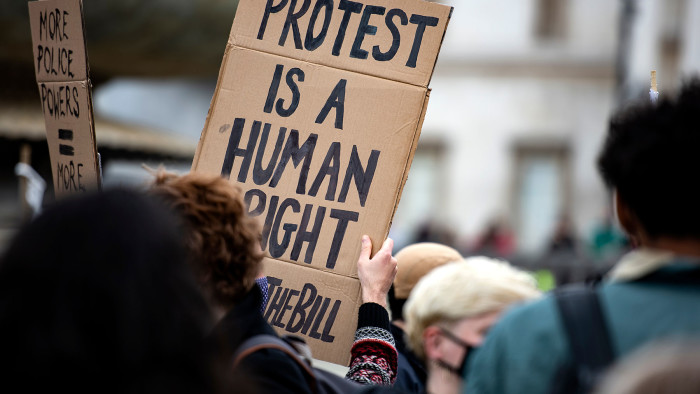
A dark day for human rights in the UK as the Policing Bill becomes law
UK Parliament passes authoritarian and racist law cracking down on protest, giving new powers to police and criminalising minoritised ethnic people
Yesterday evening, the final provisions of the Police, Crime, Sentencing and Courts Bill were agreed upon in the House of Lords, and will soon receive Royal Assent.
The police and criminal justice authorities will soon have new powers, and new criminal offences will soon be introduced, among others:
- Police will have the power to stop protests due to ‘noise’ or even ‘unease’, and restrict protests which may result in ‘serious disruption’;
- Criminalising Gypsy, Roma and Traveller peoples’ way of life via restrictions on ‘unauthorised encampments’;
- Extended stop and search powers built around racialised narratives on ‘gangs’ and knife crime, certain to target Black people and people of colour;
- New ‘serious violence reduction orders’ which can make restrictive civil orders (with criminal punishments) on people with minimal evidence of involvement in criminality, also certain to be used against minoritised ethnic people;
- Police can force schools and health authorities to share people’s personal information with the police, outside of investigations; and
- ‘Remote’ video and audio link hearings can be used in criminal cases, at the judges discretion, with no meaningful protection for Disabled defendants and defendants with learning difficulties, among other impacted people.
Fair Trials opposed this authoritarian and discriminatory law from it’s introduction in March 2021, and was part of a coalition of hundreds of civil society and grassroots organisations opposing the anti-protest and ‘unauthorised encampment’ restrictions and powers, and a coalition on the ‘serious violence’ and data-sharing provisions.
Fair Trials also challenged the widespread implementation of ‘remote’ video and audio hearings in criminal justice, having amendments tabled to safeguard defendants, especially disabled defendants, alongside many disability charities.
The Bill was opposed by three UN Special Rapporteurs and the Council of Europe Human Rights Commissioner, Parliament’s joint Committee on Human Rights, hundreds of civil society organisations, hundreds of thousands of members of the public who signed petitions, and even many former senior police officers. However, with such a heavy right-wing majority in Parliament, the government has almost free reign to pass such authoritarian and oppressive laws.
Fair Trials worked closely with many other organisations and individuals on the Bill and would like to express thanks and solidarity with them, especially those in the Police Bill Alliance, for their tireless work.
Our key work on the Bill includes:
- Fair Trials briefing on the Police, Crime, Sentencing and Courts Bill (March 2021)
- Fair Trials submission to the Police, Crime, Sentencing and Courts Bill Public Bill Committee (May 2021)
- Joint briefing on ‘serious violence’ reduction orders and data-sharing duty (September 2021)
- Joint briefing on video and audio link proceedings in the Police, Crime, Sentencing and Courts Bill (October 2021)
- Joint statement on the impact of video and audio links in criminal proceedings on defendants with learning difficulties, neurodiversity or mental health issues (January 2022)


